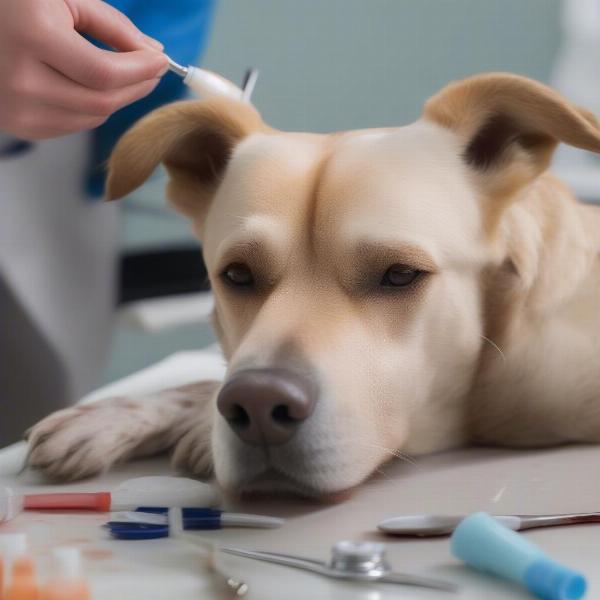Clinacin, also known as clindamycin, is an antibiotic sometimes prescribed for dogs. It’s crucial to understand its uses, dosage, potential side effects, and precautions before administering this medication to your canine companion. This guide provides a thorough overview of Clinacin for dogs, equipping you with the necessary knowledge to ensure your pet’s safety and well-being.
Clinacin is a lincosamide antibiotic that works by inhibiting bacterial protein synthesis. This action effectively halts the growth and spread of bacteria, making it useful for treating a variety of infections in dogs. Commonly, veterinarians prescribe Clinacin for skin infections, such as abscesses, bite wounds, and pyoderma. It’s also effective against bone infections, dental infections, and certain types of pneumonia. It’s important to remember that Clinacin is not effective against viral or fungal infections. Only a veterinarian can diagnose the cause of your dog’s illness and determine if Clinacin is the appropriate treatment.
Understanding the Uses of Clinacin in Dogs
What types of infections does Clinacin typically treat in dogs? Clinacin is frequently used to combat infections affecting the skin, bones, teeth, and respiratory system in canines. It is particularly effective against anaerobic bacteria, which thrive in environments lacking oxygen, like deep wounds or abscesses.
 Clinacin usage for dog skin infection
Clinacin usage for dog skin infection
Dosage and Administration of Clinacin for Dogs
Administering the correct dosage of Clinacin is crucial for its effectiveness and to minimize the risk of side effects. Never attempt to self-medicate your dog. Always follow your veterinarian’s prescribed dosage and instructions carefully. The dosage will vary depending on factors such as your dog’s weight, the severity of the infection, and the specific formulation of Clinacin being used. Clinacin is available in both oral (capsule or liquid) and topical forms. For oral administration, ensure your dog swallows the capsule whole or mixes the liquid thoroughly with food as directed.
Potential Side Effects of Clinacin in Dogs
While generally safe, Clinacin can sometimes cause side effects in dogs. Common side effects may include vomiting, diarrhea, loss of appetite, and lethargy. In rare cases, more serious side effects like difficulty breathing, seizures, or allergic reactions can occur. If you observe any adverse reactions after administering Clinacin to your dog, contact your veterinarian immediately.
Precautions and Considerations When Using Clinacin
Certain precautions should be taken when administering Clinacin to your dog. Inform your veterinarian about any other medications your dog is currently taking, as drug interactions can occur. Clinacin should be used with caution in dogs with liver or kidney disease, pregnant or lactating dogs, and dogs with a history of gastrointestinal issues.
What to Expect After Administering Clinacin
After starting Clinacin, you should monitor your dog closely for any changes in their condition. Improvement in the infection should be noticeable within a few days. It’s essential to complete the entire course of antibiotics, even if your dog appears to be feeling better, to prevent the recurrence of the infection and the development of antibiotic resistance.
Conclusion
Clinacin can be an effective treatment for bacterial infections in dogs. However, it’s vital to consult with your veterinarian for proper diagnosis, dosage, and monitoring. By understanding the uses, side effects, and precautions associated with Clinacin, you can contribute to your dog’s health and recovery.
FAQ
- Can I give my dog Clinacin that was prescribed for another pet? No. Never administer medication prescribed for another animal to your dog. Dosages vary based on individual needs.
- What should I do if my dog misses a dose of Clinacin? Contact your veterinarian for guidance. Do not double the next dose.
- Can Clinacin be used long-term in dogs? Long-term use of Clinacin can increase the risk of side effects and antibiotic resistance. Your veterinarian will determine the appropriate duration of treatment.
- Is Clinacin safe for puppies? Clinacin can be used in puppies, but the dosage needs to be adjusted carefully by a veterinarian.
- Are there any natural alternatives to Clinacin for dog infections? While some natural remedies may have antibacterial properties, they should not replace veterinary-prescribed antibiotics for serious infections. Consult with a holistic veterinarian for options.
- Can Clinacin interact with other medications my dog is taking? Yes. Inform your veterinarian about all medications your dog is currently taking to avoid potential drug interactions.
- What should I do if my dog experiences severe side effects from Clinacin? Contact your veterinarian immediately or seek emergency veterinary care.
ILM Dog is your trusted source for expert advice on dog care, offering a wealth of information on breeds, health, training, nutrition, grooming, and much more. We are committed to providing practical and reliable resources for dog owners worldwide. From puppy care to senior dog support, we’ve got you covered. For personalized guidance and expert recommendations on products and accessories tailored to your dog’s needs, connect with us. Email: [email protected], Phone: +44 20-3965-8624. Visit ILM Dog today for all your dog care needs.